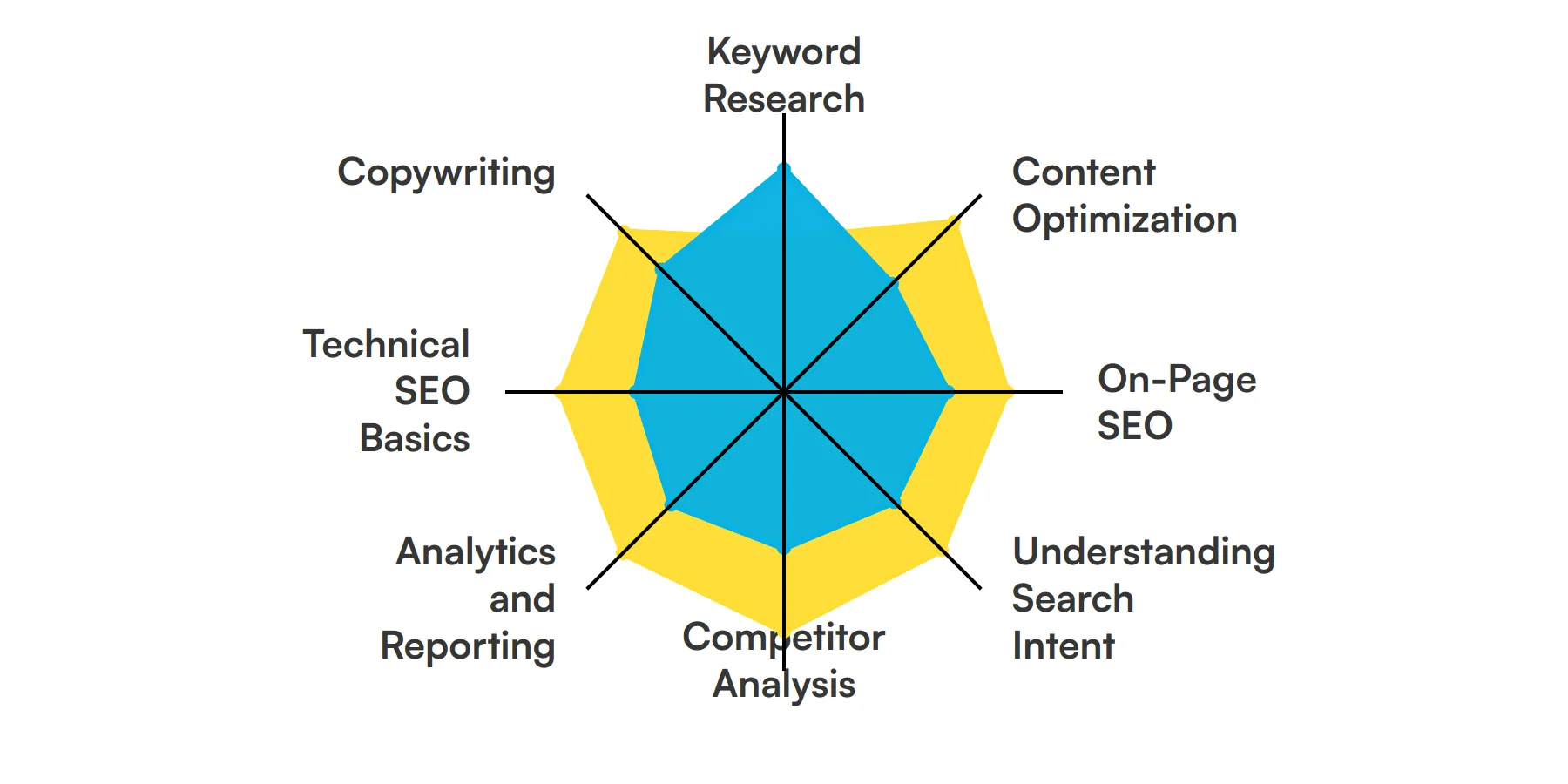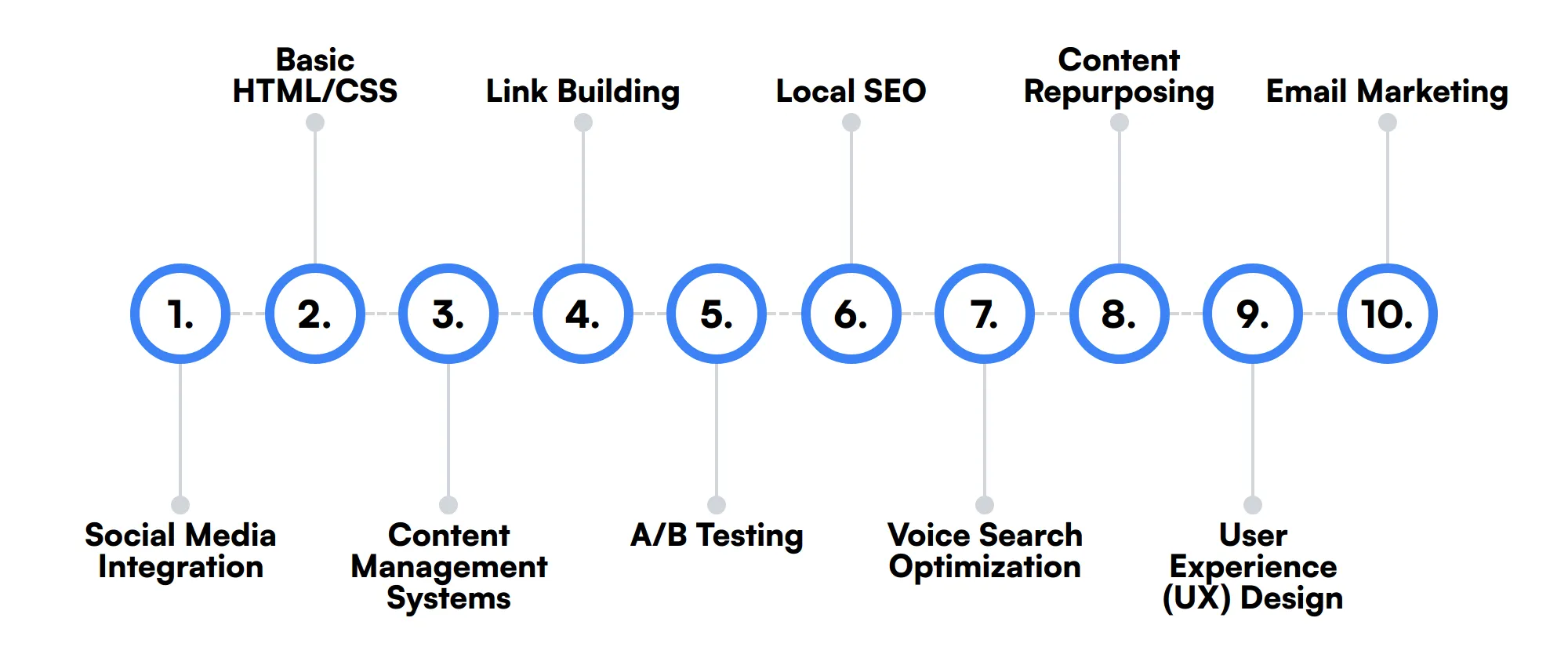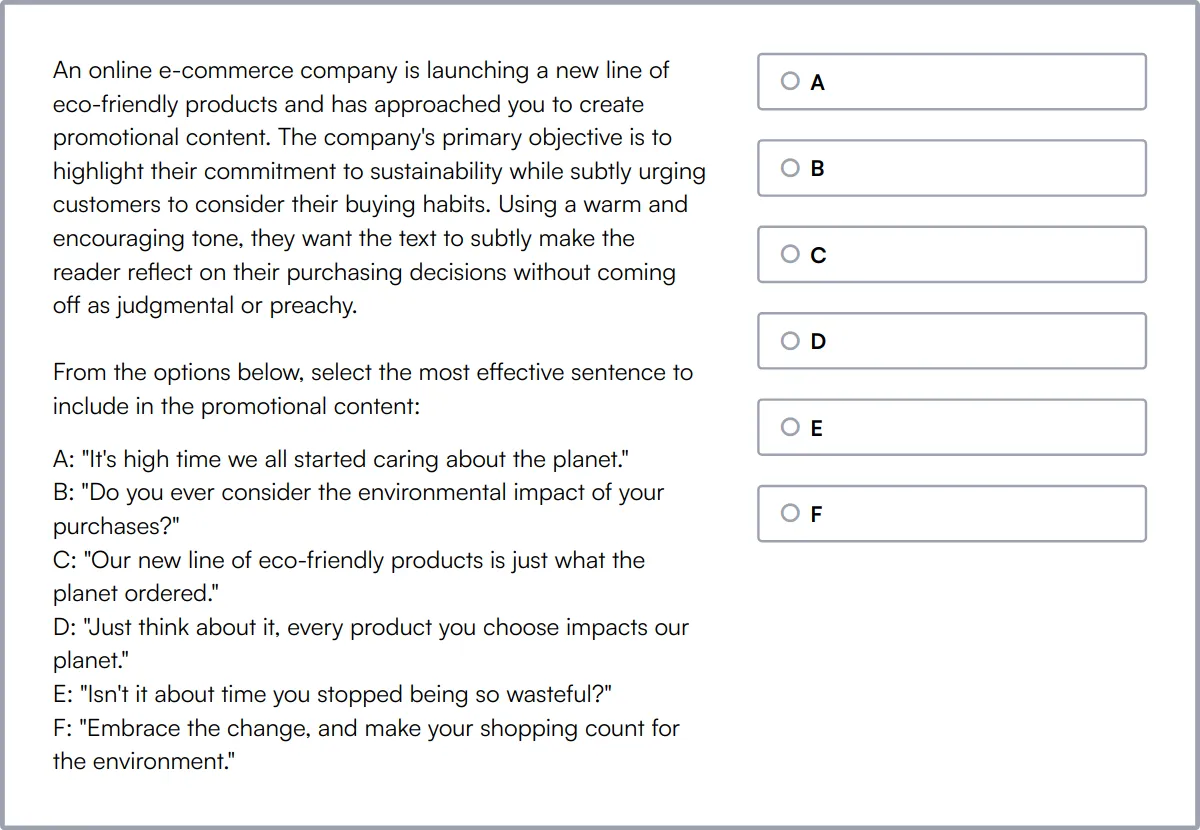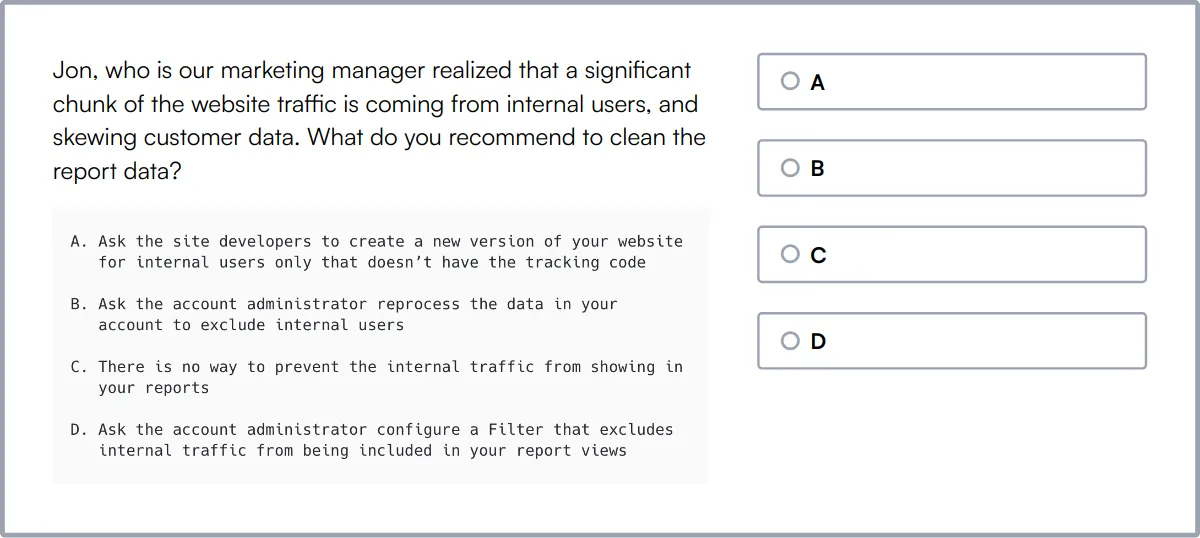A skilled SEO Copywriter is fundamental in boosting your website's visibility and engagement. They craft content that ranks well on search engines and resonates with readers, ensuring that your message not only reaches but also appeals to your target audience.
SEO copywriting requires a blend of creativity and technical proficiency, including a strong grasp of SEO principles, keyword research, and the ability to write compelling content that adheres to SEO best practices.
Candidates can write these abilities in their resumes, but you can’t verify them without on-the-job SEO Copywriter skill tests.
In this post, we will explore 8 essential SEO Copywriter skills, 10 secondary skills and how to assess them so you can make informed hiring decisions.
Table of contents
8 fundamental SEO Copywriter skills and traits
The best skills for SEO Copywriters include Keyword Research, Content Optimization, On-Page SEO, Understanding Search Intent, Competitor Analysis, Analytics and Reporting, Technical SEO Basics and Copywriting.
Let’s dive into the details by examining the 8 essential skills of a SEO Copywriter.

Keyword Research
Keyword research is the backbone of SEO copywriting. It involves identifying the terms and phrases that potential readers are searching for. An SEO copywriter uses this skill to ensure that the content aligns with what the audience is looking for, thereby increasing the chances of the content being found in search engines.
Check out our guide for a comprehensive list of interview questions.
Content Optimization
Content optimization is about making sure that the content is structured and formatted in a way that search engines can easily understand. This includes using appropriate headings, meta descriptions, and alt texts. An SEO copywriter leverages this skill to improve the visibility and ranking of the content.
On-Page SEO
On-page SEO involves optimizing individual web pages to rank higher and earn more relevant traffic. This includes optimizing title tags, internal links, and URL structures. An SEO copywriter uses on-page SEO techniques to make each piece of content as search-engine-friendly as possible.
Understanding Search Intent
Understanding search intent is crucial for creating content that meets the needs of the audience. It involves analyzing what the user is looking for when they type a query into a search engine. An SEO copywriter uses this skill to tailor content that directly answers the user's questions or solves their problems.
Competitor Analysis
Competitor analysis involves studying the content and strategies of competitors to identify gaps and opportunities. An SEO copywriter uses this skill to create content that stands out and offers more value than what is currently available in the market.
Analytics and Reporting
Analytics and reporting involve tracking the performance of content using tools like Google Analytics. An SEO copywriter uses this skill to measure the effectiveness of their strategies and make data-driven decisions to improve future content.
Technical SEO Basics
Technical SEO basics include understanding how website architecture, page speed, and mobile-friendliness affect search rankings. An SEO copywriter needs to be aware of these factors to ensure that their content is not hindered by technical issues.
Copywriting
Copywriting is the art of writing persuasive and engaging content. An SEO copywriter uses this skill to create compelling headlines, introductions, and calls to action that not only attract readers but also encourage them to take the desired action.
For more insights, check out our guide to writing a Copywriter Job Description.
10 secondary SEO Copywriter skills and traits
The best skills for SEO Copywriters include Social Media Integration, Basic HTML/CSS, Content Management Systems, Link Building, A/B Testing, Local SEO, Voice Search Optimization, Content Repurposing, User Experience (UX) Design and Email Marketing.
Let’s dive into the details by examining the 10 secondary skills of a SEO Copywriter.

Social Media Integration
Social media integration involves promoting content across various social media platforms. An SEO copywriter can use this skill to increase the reach and engagement of their content.
Basic HTML/CSS
Basic HTML/CSS knowledge helps in formatting content and making minor adjustments to the website. An SEO copywriter can use this skill to ensure that their content is displayed correctly and is visually appealing.
Content Management Systems
Familiarity with content management systems like WordPress allows an SEO copywriter to efficiently publish and manage content. This skill helps in streamlining the content creation and publication process.
Link Building
Link building involves acquiring backlinks from other websites to improve search engine rankings. An SEO copywriter can use this skill to enhance the authority and credibility of their content.
A/B Testing
A/B testing involves comparing two versions of a webpage to see which one performs better. An SEO copywriter can use this skill to optimize headlines, calls to action, and other elements to improve conversion rates.
Local SEO
Local SEO focuses on optimizing content for local search queries. An SEO copywriter can use this skill to attract local audiences and improve the visibility of the content in specific geographic areas.
Voice Search Optimization
Voice search optimization involves tailoring content to be easily found through voice search queries. An SEO copywriter can use this skill to stay ahead of the curve as more users turn to voice-activated search.
Content Repurposing
Content repurposing involves adapting existing content for different formats and platforms. An SEO copywriter can use this skill to maximize the reach and impact of their content.
User Experience (UX) Design
Understanding user experience design helps in creating content that is not only informative but also easy to navigate. An SEO copywriter can use this skill to enhance the overall user experience on the website.
Email Marketing
Email marketing involves creating and sending targeted email campaigns. An SEO copywriter can use this skill to drive traffic to their content and engage with their audience on a more personal level.
How to assess SEO Copywriter skills and traits
Assessing the skills and traits of an SEO Copywriter involves more than just glancing at their portfolio or reading through their resume. It requires a deep dive into their ability to blend creativity with technical SEO expertise to drive content that not only engages but also converts.
To truly gauge an SEO Copywriter's effectiveness, one must evaluate their proficiency across a spectrum of skills such as Keyword Research, Content Optimization, and Understanding Search Intent.
While traditional hiring methods rely heavily on subjective assessments, modern tools like Adaface offer a more objective and precise way to measure these skills. By utilizing Adaface assessments, you can ensure a 2x improvement in the quality of your hires. For more details on how Adaface can streamline your hiring process, visit Adaface assessments.
Let’s look at how to assess SEO Copywriter skills with these 3 talent assessments.
PPC Assessment Test
Our PPC Assessment Test evaluates candidates' skills in pay-per-click advertising, digital marketing, and online advertising. This test is designed to assess their ability to conduct keyword research, write compelling ad copy, and optimize campaigns for better performance.
The test covers a range of topics including keyword research, ad copywriting, bid management, landing page optimization, and conversion tracking. Candidates are presented with scenario-based multiple choice questions that require them to apply their knowledge to real-world PPC advertising challenges.
Successful candidates demonstrate proficiency in campaign optimization, budget management, and market analysis. They also show a strong understanding of analytics and reporting to track and improve campaign performance.
Copywriting Skills Test
Our Copywriting Skills Test focuses on evaluating candidates' grammar, vocabulary, and attention to detail. This test helps identify individuals who have a strong command of the English language and can create engaging and effective copy for various formats and mediums.
The test assesses skills such as headline writing, subheading creation, SEO writing, and call to action (CTA) creation. It also evaluates candidates' ability to understand and target different audiences, write for social media, and edit and proofread their work.
High-scoring candidates excel in writing for different stages of the customer journey, understanding brand voice and tone, and writing with empathy. They also demonstrate the ability to measure and analyze copy performance and conduct A/B testing to optimize their content.

Google Analytics Test
Our Google Analytics Test assesses a candidate's ability to use the Google Analytics platform to make data-driven decisions. This test evaluates their skills in setting up website tracking, analyzing website traffic, and understanding audience demographics.
The test covers topics such as creating and customizing reports, tracking website traffic, analyzing user behavior, and setting up goals and conversions. Candidates are tested on their ability to implement e-commerce tracking and use Google Analytics for marketing campaigns.
Successful candidates show proficiency in advanced analytics techniques, Google Analytics API, and Google Tag Manager integration. They demonstrate the ability to drive more targeted traffic and generate leads through data analysis.

Summary: The 8 key SEO Copywriter skills and how to test for them
| SEO Copywriter skill | How to assess them |
|---|---|
| 1. Keyword Research | Evaluate their ability to identify relevant and high-traffic keywords. |
| 2. Content Optimization | Check how they enhance content for better search engine visibility. |
| 3. On-Page SEO | Assess their skills in optimizing individual web pages for search engines. |
| 4. Understanding Search Intent | Determine their capability to align content with user search queries. |
| 5. Competitor Analysis | Gauge their proficiency in analyzing and learning from competitors' strategies. |
| 6. Analytics and Reporting | Review their expertise in interpreting SEO data and generating reports. |
| 7. Technical SEO Basics | Test their knowledge of technical aspects affecting search engine rankings. |
| 8. Copywriting | Evaluate their ability to write engaging and persuasive content. |
Copywriting Skills Test
SEO Copywriter skills FAQs
What is the importance of keyword research in SEO copywriting?
Keyword research helps identify the terms and phrases your target audience is searching for, allowing you to create content that meets their needs and improves search engine rankings.
How can I assess a candidate's ability to optimize content?
Ask for examples of past work where they improved content rankings. Look for their understanding of keyword placement, meta descriptions, and internal linking.
What should I look for in a candidate's on-page SEO skills?
Evaluate their knowledge of title tags, header tags, URL structure, and image alt text. Ask them to perform an on-page SEO audit on a sample page.
How do I test a candidate's understanding of search intent?
Provide different search queries and ask them to explain the intent behind each. Check if they can align content with user needs.
Why is competitor analysis important in SEO copywriting?
Competitor analysis helps identify gaps and opportunities in your content strategy. It allows you to understand what works well in your industry.
What tools should an SEO copywriter be familiar with for analytics and reporting?
They should know how to use Google Analytics, Google Search Console, and other SEO tools like SEMrush or Ahrefs to track performance and generate reports.
How can I evaluate a candidate's technical SEO knowledge?
Ask them to explain basic concepts like site speed, mobile-friendliness, and XML sitemaps. A practical test on identifying technical issues can also be useful.
What role does social media integration play in SEO copywriting?
Social media can drive traffic to your content and improve its visibility. Assess if the candidate knows how to create shareable content and use social media platforms effectively.

40 min skill tests.
No trick questions.
Accurate shortlisting.
We make it easy for you to find the best candidates in your pipeline with a 40 min skills test.
Try for freeRelated posts
Free resources



